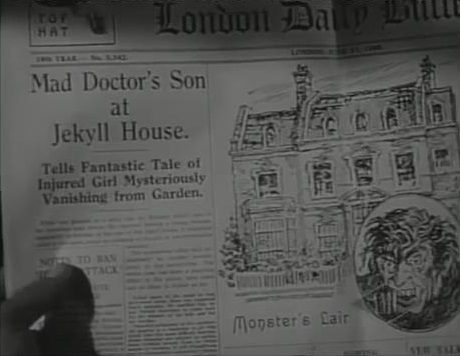The Son of Dr. Jekyll

“So, the stuffed
shirts thought they’d get you to knuckle under, did they.”
“They did, until
I reminded them that I was your protégé, and your motto was ‘No Compromise.’”
“Well, that was
before they knighted me.”
Edward Jekyll,
who resigns from the Royal Academy of Science and takes up residence in his
father’s London townhouse, where Lanyon and Utterson witnessed the doctor’s terrible end, chased by a
torchlight mob, home and laboratory fired, the monster falling from an upper
floor to the street below (the opening sequence, a bravura night piece), a man
described by Lanyon as “unpopular”, the late Henry
Jekyll, author of Studies in Abnormality and An
Experiment in Changing Human Personality, the
latter in manuscript.
Edward is
cheerful, soon to be married. “What’s the Royal Academy got that I haven’t?”
“Poobahs,” Lanyon tells him. The
influence of Welles (Citizen Kane,
also The Stranger) is on the film
perceptibly. “A bad dream,” says Michaels the manservant, “I have ‘em as well, Sir, even when things are tiptop. There’s no
explaining it, I expect.”
Mrs. Jekyll was
in show business, murdered by her husband. “I suggest that the face in the
mirror was yours, but in your tortured mind it became the image of your
father.”
“It couldn’t have
been!”
The conclusion is
a variant of the opening, “enough light for everyone to see the truth.”
Leonard Maltin, “poorly scripted, produced; cast manages to save film from
complete ruin.” TV Guide,
“moves so slowly, the audience wants them both dead and buried anyway.” Hal
Erickson (Rovi) observes no transformation, “can scarcely be
designated a horror film,” it is exceptionally
well-managed. Halliwell’s Film Guide,
“irresistibly silly”.